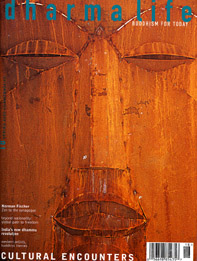Politics of Liberation
A series of controversies surrounding the Dalai Lama's celebration of the Kalachakra Festival in Bodh Gaya highlighted the difficult and precarious nature of his position in India. The festival is the biggest gathering of Buddhists worldwide, and in January 100,000 pilgrims swarmed to the site of the Buddha's Enlightenment to receive the initiation - said to assist the realisation of Enlightenment in a single lifetime.
The Dalai Lama is a world figure whose thoughts on international events are frequently sought and widely reported. He actively advocates non-violence, and his views were broadcast in the aftermath of September 11th. But there is a narrow line between such activity and comments that have implications for Indian politics.
In September the Dalai Lama was reported as making comments supporting autonomy for the troubled Indian state of Kashmir. Despite arguments that his words had been misconstrued, the result was a chorus of protest from within India. Some claimed that by interfering in Indian affairs the Dalai Lama was abusing his refugee status. Several militant Hindu organisations threatened to mount demonstrations at the Kalachakra Festival; there were even reported threats to blow up the local Tibetan Buddhist monastery.
To make matters worse, the Kalachakra festival coincided with a state visit to India by the Chinese Premier. Chinese officials complained to the Indian government that an exhibition beside the Kalachakra festivities included criticism of the Chinese occupation of Tibet. But as the festival is a gathering for the whole Tibetan refugee community, it reflects many aspects of their culture, and politics inevitably looms large.
Further criticism came from indigenous Buddhist monks, who are mostly Ambedkarites from Dalit communities [see Rallying to freedom, page 32]. Unlike the Tibetans-in-exile, Dalits are deeply involved in Indian affairs. The focus of Bodh Gaya is the Mahabodhi Temple - the holiest site in the Buddhist world. However, the temple is controlled by Hindus, and this has long been a source of conflict. The Indian Buddhists' protests were prompted by the replacement of a Buddhist monk by a Hindu as chairman of the Temple Committee. Consequently, four of the monks started a hunger strike demanding the temple's 'liberation', Meanwhile Bhante Anand, General Secretary of the All India Monks Association denounced the Dalai Lama for failing to support demands for Buddhist control of the shrine.
Other difficulties arise from differences between the customs of Theravadin Buddhists, such as the Indian monks, and Tibetan Buddhists. For example, Tibetans do not take off their shoes in the temple compound, a custom on which the Theravadins insist. Anand also complained that the Kalachakra ceremony was not authentically Buddhist, and that the Dalai Lama was wrongly regarded (by non-Buddhists) as the leader of all Buddhists.
Perhaps an underlying cause of tension is the contrast between the Tibetans' high profile and the Indians' low status. The Dalits (formerly considered 'Untouchable' under the Hindu caste system) want support in their conversion to Buddhism; the Tibetans are unable to lend such support. Sensitivities in India are such that Tibetans are urged by some people to get involved in issues, and if do they're criticised by others for interfering.
As the festival approached, tensions mounted further still. India deployed special troops, amid new rumours of infiltration by Chinese agents posing as Buddhist monks. At last in January 12,000 monks, 800 nuns and many thousands of ordinary Tibetan Buddhists descended on Bodh Gaya for the initiation. There were also many western devotees, who followed proceedings via a translation broadcast on fm radio.
At the eleventh hour, however, the Dalai Lama was unable to perform the ceremony due to an attack of gastro-enteritis. He was taken to hospital, where he made a successful recovery. The first part of the ceremony was conducted by the Ganden Tripa, titular head of the Gelug sect, but the rest was cancelled.
The Kashag (Tibetan parlia-ment) ascribed the Dalai Lama's illness to 'exhaustion from prolonged tours, teaching and other engagements, which did not give him time to recuperate'. It requested that he rest for at least three months, postponed his tour schedule for March and April, and asked that no requests for audiences or engagements be made to him.



